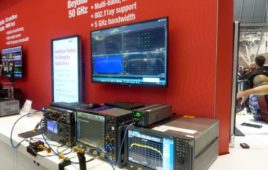As the FCC prepares to vote next week on a draft order that seeks to ease small cell deployments and expedite 5G availability, members from two of the Broadband Deployment Advisory Committee’s working groups each submitted letters taking issue with the lack of input the agency utilized from certain stakeholders.
Specifically, City Attorney Kevin Pagan, who represents McAllen, Texas and is part of the BDAC’s Removing State and Local Regulatory Barriers Working Group, said the FCC’s proposed order doesn’t reflect opposing views from local government representatives within the group.
“Neither I, nor the other local government representatives on that working group, agreed with the Barriers Working Group’s conclusions, and independently developed a minority report to express our objections in detail,” Pagan wrote in the Monday filing. “The majority of the working group minimized local government input into their report and voted to exclude our minority report from the documents delivered to the full BDAC.”
In the minority report, filed in January, municipality representatives said they don’t believe the FCC possess the legal authority to regulate rates or demand local access for wireless carriers, and that minority stakeholders’ dissenting views were regularly not reflected in reports generated by the working group.
“Because state and local interests were far outnumbered in both the BDAC itself and on the various working groups, the proposed ‘consensus reports’ more often than not reflect only industry’s interests while turning a blind eye to the position of municipalities,” the 81-page report said.
Pagan asserts that this issue appears to hold over to the draft order, where the FCC utilizes BDAC reports to support its proposals.
“To the extent the Commission cites BDAC materials, it should also acknowledge the dissenting views included in the BDAC’s record, particularly when referencing local government perspectives, which have been consistently minimized throughout the BDAC’s process and working group reports,” Pagan wrote.
Separately, on Tuesday, Debbi Goldman, the representative for Communications Workers of America on the BDAC’s Model Code for Municipalities Working Group, also submitted a letter expressing “serious concern,” with the draft order.
Goldman said the proposal, which is slated to be voted on Sept. 26, is not in line with recommendations submitted by the working group, ignores views of critical stakeholders, and is also an overreach of federal authority.
The proposed order would require local governments to complete the review process of small cell applications within two to three months and outlines guidance on small cell review fees charged by state governments to avoid excessive fees.
Goldman asserts that the draft order’s proposed fee levels—which set “presumptively reasonable” costs at $270 per year per site—are “unreasonable and will harm local policy innovation.”
She noted that the Model Code for Municipalities Working Group didn’t come to a conclusion on fee levels due to lack of agreement.
“It [the FCC’s proposed ruling] will foreclose the ability of municipalities to reach agreement with service providers to provide funding to local programs working to close the digital divide,” Goldman wrote. “The result will be a persistent digital divide and communities left behind.”
Goldman also took issue with the commission’s restriction on local aesthetic requirements and historical review.
“Federal standards cannot address the unique concerns of every community in America. The Commission’s aesthetic controls effectively remove public input from citizens and taxpayers and grant power to an unelected federal agency,” Goldman said.
Again Goldman noted that the BDAC working group did not issue a decision on the definition of the size of “Small Wireless Facility,” because they could not reach a consensus. However, the draft order defines the equipment can be up to 28 cubic feet in volume.
Goldman indicated the group worked for more than a year to develop recommendations for model municipal codes, which were approved by the full BDAC with only minor changes, but those guidelines were not reflected in the FCC proposal.
“The draft order ignores our work, choosing instead to further the interests of the wireless industry over that of the public,” Goldman wrote.
Siting delays and high costs associated with small cell deployments have long been an issue for wireless providers trying to densify their networks. For its part, the FCC is aiming to accelerate 5G build-outs, and FCC Commissioner Brendan Carr said the draft order builds on “commonsense reforms” already enacted in 20 states.
The plan, introduced by Carr, will reportedly save $2 billion in unnecessary fees, generate $2.5 billion in additional small cell deployments, and create more than 27,000 jobs.
An industry-backed study commissioned by CTIA in March found that the new rules could save $1.6 billion through 2026. It also projected small cell deployments would increase from about 13,000 in 2017 to 138,000 this year and 821,000 by the end of the study window.


